Attending a convention as a writer can be a ton of fun, but it’s also work. You’re putting on your public face, asserting yourself as a working professional, and forging connections that could become an incredible asset in the short, medium, and/or long-term.
Here are some general pieces of advice for professional development and self-care at conventions:
1) Be genuine. Being the best, most generous and excited version of yourself is probably the best support you can give your career in terms of activities at a convention. If you’re naturally shy, you don’t have to put on false airs and try to be a social butterfly, but try to be the friendliest version of yourself. If you excel in small groups, find and build small groups and have those great in-depth conversations. If you’re the life of the party, be the life of the party. But remember that you’re a professional. Each community and con is going to have its own tone, and try to match that tone – some conventions are more academic, others more fannish. Sometimes the enthusiasm will need to be more reserved to fit in, other times you can squee all over the place.
2) Be positive. You’re at the con because of a shared passion for narrative. The people you meet will very likely be your tribe – they’ll get more of your jokes, have read more of the books you love, and should, in general, be ‘Your People.’ That’s really exciting, and it’s great to be enthusiastic.
The back edge of this rule is that I don’t recommend spending much if any time throwing shade or trash-talking other authors or their work. Best-Selling Author’s writing may be drivel in your informed opinion, but that person is a peer, trying to make a living in the same career you’re building for yourself. Plus, it’s bad Karma to cast aspersions. And if you trash-talk in public or in small circles, people may associate you more with that negativity than anything positive, especially if they happen to love Best-Selling Author’s work. Thoughtful critique is fine, especially in small circles of colleagues/peers.
3) Take care of yourself. This ranges from making sure you eat enough (recommended two meals a day minimum, or whatever you need to function, whatever is greater), taking pride in your hygiene, dressing to impress (assume conventions are business casual until told otherwise, and ask whether there’s an awards ceremony or banquet. If you’re going to go to either, pack something a step up from your default wear). Taking care of yourself also means making sure you get alone time to de-compress when you need it. Conventions are very taxing, and if you need to skip a panel to take a nap, or just take a breather, then do it. If possible, figure out times that you can use for solo relaxation ahead of time, so you know when you have breaks available.
4) Eat socially. Meals are some of the best opportunities you will have at conventions to make real, lasting connections with people. If possible, invite a new friend you’ve made during the day to dinner, and assemble a dinner posse of a size that’s workable for your temperament (love small groups? Get a small group for dinner), and head off for some food and fun.
5) Enjoy the Bar-Con. Most genre fiction conventions have a designated Convention Bar. Writers and publishing professionals often congregate there in the evenings. You’ll see editors holding court, authors entertaining their colleagues and/or fans, and aspiring pros trading tips and making friends. You most certainly don’t have to drink, but BarCon can be a great part of a convention experience, and buying someone a drink is a solid invitation to a chat (especially if you make it clear that said drink is not the start of a pick-up attempt). As indicated above, if you’re at a convention, you already have something in common with your fellow attendees, and chances are, they will be excited to talk to you.
5a) But don’t over-indulge. Everyone has their limits, and you should know yours. If you’re effective socially when tipsy, that’s fine. If you go directly from drunk to sick, that’s bad. Or if you’re an angry drunk, that’s also bad. Know your limits, and remember that you’re being a professional.
6) Know how to open a conversation. I’ve developed a series of stock questions that serve as conversational openers at cons.
In the first day or two of the convention: “How was your trip in?” “Did you get in today?” “Are you on panels this weekend?”
Anytime: “How’s your con going?” “What are you working on these days?” (works for writers, editors, and some other publishing professionals) “What have you been excited about lately?” (this can be books, projects, movies, etc.) “Any panels you’re particularly excited about this week?”
If this is your first time at a given convention: “This is my first time at <Con>. Is there something I absolutely shouldn’t miss?”
Towards the end of the con: “How was your con?” “Were you on panels?” “What was your favorite panel?” “When are you headed home?”
7) Talk about your work when invited. Chances are, you’ll end up talking to other writers. In those cases, shop talk is expected. Ask people about their work, and they’ll probably ask about yours. When talking to readers, reviewers, booksellers, editors, etc., it’s fine to talk about your work, but do so briefly, and try to limit it to when you’re invited to talk about your work or when you’ve already talked about something else for a while. Hand-selling your book to people at conventions is not a way to make a living, and if you’re obnoxious about it, then it could have a net-negative effect of turning someone off. As with many things, there’s a balance to be found between wanting to get the word out there and not being too pushy.
8) Be generous. Praise the work you found inspirational and exceptional. Compliment people when they excel on a panel as a participant or a moderator, or ask an insightful question. Thank your servers. Tip well. Thank booksellers for supporting your work. Thank fans for reading your work. Thank reviewers for discussing your work and for supporting the genre. Thank everyone for their time when you talk with them. Wish people well and support their endeavors. The more robust sales in your genre are, the better a chance your work has of succeeding.
9) Take business cards. I still use business cards a lot at conventions. Whenever possible, I take notes of where I met someone, so that when I go back over my stack of cards the next week, I can put names & Faces to conversations. “John Steele – Talked about Indiana Jones at Sushi.” “Gina Chen – dinner on Sunday, writes Middle Grade Horror.” This way, you can follow up with all the cool people you met, sending them short emails and/or Facebook messages to say how much you enjoyed meeting them and talking about <X>. This helps cement short-term acquaintanceships into burgeoning friendships.
10) Think about making friends, not networking. If you want to be in the writing business long-term, you’re going to be around the same people for decades. So why not regard your community as a group of friends who are also business associates, rather than thinking about people first and foremost in terms of what they can do for you as connections.
#SFWApro


